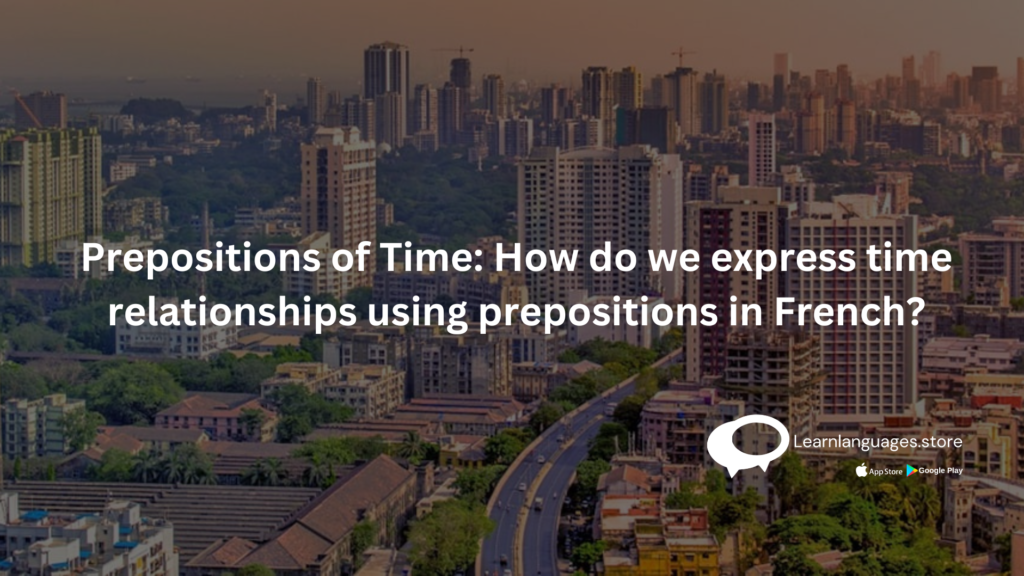Prepositions of Time: How do we express time relationships using prepositions in French?
Prepositions of Time: How do we express time relationships using prepositions in French?
Estimated reading time: 3 minutes

 
 
Prepositions of Time in French:
Prepositions of time are essential in French for indicating when an action occurs or for specifying the duration of an activity. These prepositions help establish temporal relationships between events, whether it’s expressing the time of day, specifying a duration, or indicating when an action began.
 
List of Prepositions of Time:
- À Рused to indicate specific points in time, such as hours, days, or dates.
Example: Je vais au cin√©ma √† 19 heures. (I’m going to the cinema at 7 p.m.) - En – used to express the duration of an action or to indicate specific months or years.
Example: Il est né en 1990. (He was born in 1990.) - Dans Рused to express a future point in time or to specify the duration before an event.
Example: Nous partons dans une semaine. (We leave in a week.) - Depuis – used to indicate the starting point of an action or event and to express the duration of an ongoing action.Example: Il travaille ici depuis trois ans. (He has been working here for three years.)
- Pendant – used to indicate the duration of an action or event.
Example: Nous avons voyagé pendant deux semaines. (We traveled for two weeks.)
 
Identifying in a Sentence:
- “Je vais au cin√©ma √† 19 heures.” (I’m going to the cinema at 7 p.m.)
- “Il est n√© en 1990.” (He was born in 1990.)
- “Nous partons dans une semaine.” (We leave in a week.)
- “Il travaille ici depuis trois ans.” (He has been working here for three years.)
- “Nous avons voyag√© pendant deux semaines.” (We traveled for two weeks.)
 
Conditions and Exceptions:
- À: Used for specific points in time, but not for months or years.
- En: Used for months and years, but not for hours or days.
- Dans: Used for future points in time or durations before an event.
- Depuis: Used to indicate the starting point of an action or event, and always followed by a duration.
- Pendant: Used to indicate the duration of an action or event, often followed by a duration.
 
Importance:
Mastering prepositions of time in French is crucial for accurately expressing when an action occurs or how long it lasts. Using these prepositions correctly ensures clear communication and helps avoid confusion in conversation.
 
Funny Examples:
- “Je vais au cin√©ma √† 19 heures. Let’s hope the movie doesn’t start √† l’heure indienne!” (I’m going to the cinema at 7 p.m. Let’s hope the movie doesn’t start on Indian time!)
- “Il travaille ici depuis trois ans. At this rate, he’ll become the office plant!” (He has been working here for three years. At this rate, he’ll become the office plant!)
 
WANT TO LEARN MORE?
Ready to dive into French grammar and become fluent? Join our French A3 Level course at Learn Language Store! With engaging lessons, humorous examples, and expert guidance, you’ll master prepositions of time and much more. Enroll today and take your French skills to the next level!
 
-
Product on sale
 French DELF B1
French DELF B1₹32,600.00
₹42,600.00 -
Product on sale
 French DELF A2
French DELF A2₹24,300.00
₹32,600.00 -
Product on sale
 French A1
French A1₹18,300.00
₹24,300.00
Learn Languages Store
Vashi,
Email: services@learnlanguages.store










